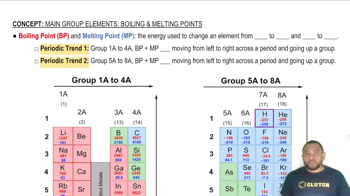Here are the essential concepts you must grasp in order to answer the question correctly.
Electron-Sea Model
The electron-sea model describes metallic bonding as a structure where electrons are delocalized and free to move throughout a lattice of positively charged metal ions. This 'sea' of electrons allows metals to conduct electricity and contributes to their malleability and ductility. The strength of the metallic bond, influenced by the number of delocalized electrons, plays a crucial role in determining the melting point of metals.
Recommended video:
Metallic Bonding Strength
The strength of metallic bonds varies among different metals, primarily due to the number of valence electrons that can participate in the electron-sea. Magnesium, with its two valence electrons, forms stronger metallic bonds compared to sodium, which has one. This increased bonding strength in magnesium results in a higher melting point, as more energy is required to overcome these bonds during the melting process.
Recommended video:
Melting Point and Atomic Structure
The melting point of a substance is influenced by its atomic structure and the type of bonding present. In metals, a higher melting point typically indicates stronger metallic bonds and a more stable lattice structure. Magnesium's higher melting point compared to sodium can be attributed to its greater atomic mass and the stronger interactions between its ions and the delocalized electrons, leading to a more stable arrangement that requires more energy to disrupt.
Recommended video:
Boiling Point and Melting Point




